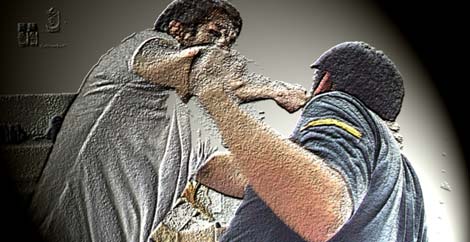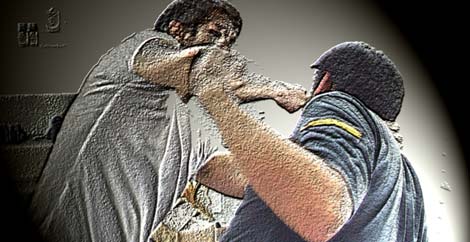"Contrary to popular belief, straight people do not have a monopoly on abusive relationships."
- The tagline from a recently commissioned poster by Fenway Community Health Center's Violence Recovery Program

It is not a kinky act of S & M.
And it is definitely not just another "lover's quarrel".
Domestic violence refers to a pattern of behaviour in which one person tries to control the thoughts, beliefs or conduct of a partner through a cycle of abuse which includes (but is not limited to) physical and sexual abuse, psychological and emotional abuse, property destruction, threats and intimidation, and homophobic manipulation.
Although there has been an increased focus in recent years on domestic violence, such efforts have been predominantly directed to heterosexual relationships, specifically to the needs of women escaping violent male partners. However, domestic violence is not a discriminatory phenomenon restricted only to the heterosexual community.
In their book, Men Who Beat The Men Who Love Them, Island & Letellier estimate that between 15 - 20% of gay and lesbian couples are affected by domestic violence and describe gay male domestic violence as "the third most severe health problem facing gay men today", trailing behind only AIDS and substance abuse. Corroborative studies by other researchers have shown that the rate of domestic violence in lesbian relationships can in fact go significantly higher - between 30% - 50%.
However, these estimates substantially under represent the true extent of the problem, due to the taboo surrounding same sex domestic violence and the general reluctance of the gay and lesbian populations to report or address issues on domestic violence. The situation is further aggravated by the lack of information, education and community discussion around same sex domestic violence especially in Asian countries.
Yet despite the threat(s) to their physical and mental health, many gays and lesbians still find it difficult to extricate themselves from abusive relationships. One of the reasons could be attributed to the victim's lack of access to money, housing, transportation or emotional support. Victims may, in fact, face disbelief and find themselves subject to judgement from both the gay and lesbian communities as well as family and friends. They may also be too frightened by their lovers' threats to attempt to leave or they may refuse to believe that someone they love would purposefully try to hurt them and foolishly think that the abuse will stop.
Another crucial factor is the real fear of being "outed" when making reports or claims of same sex domestic violence. The police and the courts tend to be heterosexist institutions in which homophobia flourishes. Many victims fear potential re-victimization through homophobia, disbelief and degradation from institutions that have a history of exclusion, hostility and violence towards gay men and lesbians. It is therefore not surprising that lesbian and gay victims of domestic violence are reluctant to seek legal solutions to stop the abuse.

Many victims also do not wish to disturb the belief in "lesbian and gay utopias". With homosexual love regarded by most PLUs as a deconstruction of the power differences inherent in heterosexual relationships, many gays and lesbians tend to "over-idolise" queer love. For instance, lesbians may be reluctant to concede that lesbian relationships are not always equal, that lesbians can be, and sometimes are, violent towards their partner - just like men. Likewise, gay men may similarly rely on the view that they are "more evolved" than their heterosexual counterparts, and hence "incapable" of relationship abuse. To recognise and give voice to the existence of domestic violence in same sex relationships would be tantamount to adding to the already substantial arsenal of weapons employed by homophobes to oppress lesbians and gay men.
Homophobia in society constantly denies and invalidates the reality of lesbian and gay love, especially the existence of lesbian and gay relationships, let alone abusive ones. In response to such blatant discrimination, it is no wonder that many gay men and lesbians tend to be over-protective of same sex relationships and as a result, display an unwillingness to recognise abuse when it happens. The bottom line is that until and unless lesbian and gay communities acknowledge the growing existence of domestic violence in same sex relationships, and indicate a commitment to ensuring victims are adequately supported, progress is unlikely.
Till then, help yourself or someone you know who's trapped in an abusive relationship by making sure that they understand that no one has the right to batter and no one deserves to be battered. And that everyone gay, lesbian or otherwise, deserves to live their lives freely and with dignity.











 Printable Version
Printable Version











Reader's Comments
Be the first to leave a comment on this page!
Please log in to use this feature.